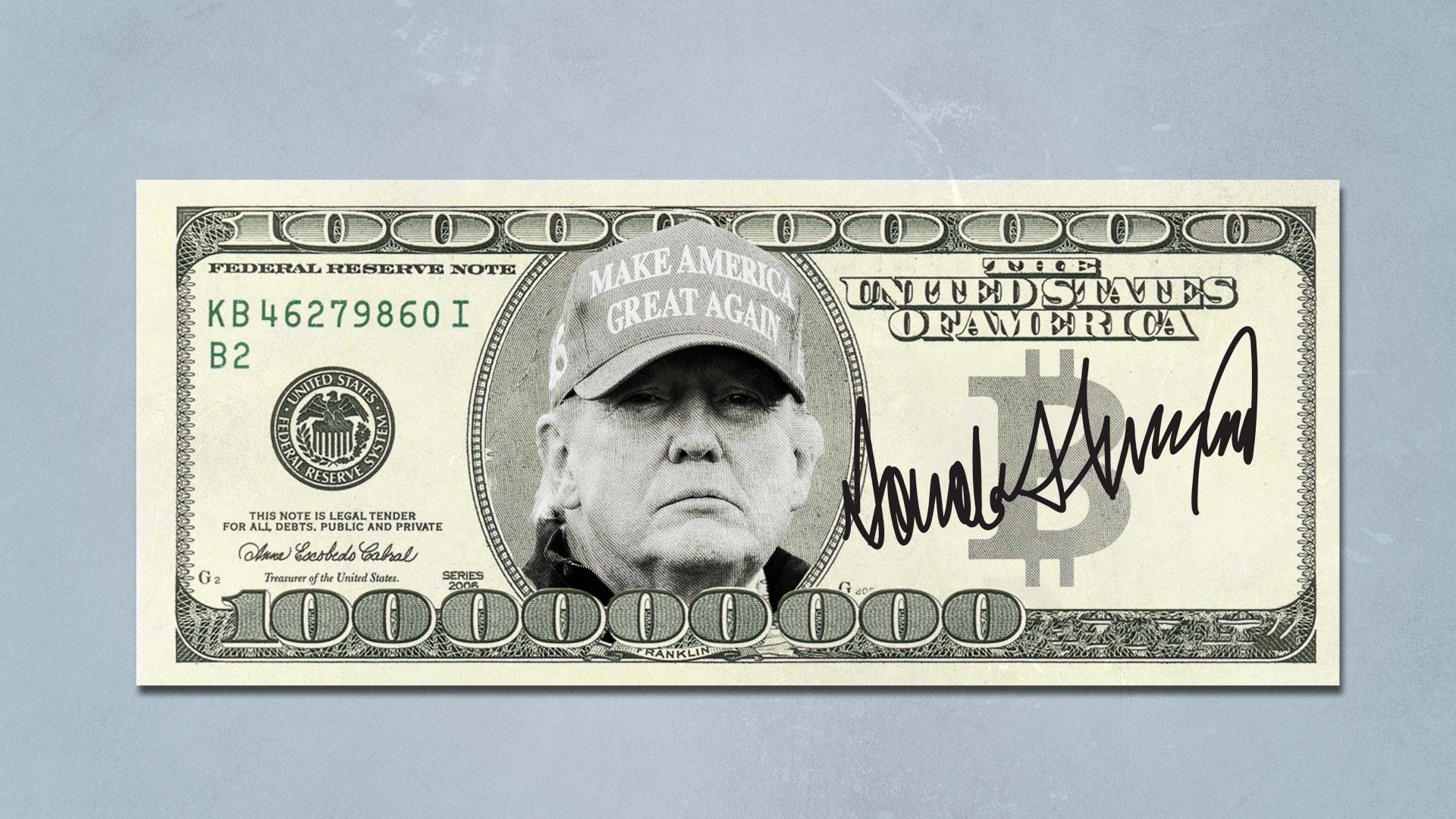During the years that I have written about Bitcoin, it has been priced at as little as one penny per coin. Today, that virtual coin you could buy for a cent in 2011 sells for around £67,000. The total value of all the Bitcoins in circulation is around £1.3 trillion – more than enough to fund an entire year of UK public spending, or to pay off around half the UK’s national debt.
More than £250 billion of that ‘value’ of Bitcoin has accumulated in the wake of the US elections. Donald Trump – never a man shy to promote a dubious get-rich-quick scheme – had embraced crypto culture during the election, promising to make the US the “crypto capital of the planet”.
Despite some half-hearted and arguably ill-judged attempts by Kamala Harris to play for the crypto vote, the industry bet on Trump and the Republicans – donating heavily to pro-crypto candidates – and his victory is paying off for them. They expect regulators on their side, a friendly White House, and for the price of their digital assets to go up “to the moon”.
On Tuesday evening the price of one Bitcoin was hovering around £68,500. Fans believe it will go even higher.
What the fans still can’t say is what any of it is supposed to be for, or what it actually does. Bitcoin is a thing you buy if you want to make money, duh.
When reporting an early story on Bitcoin, someone offered to send me around 200 Bitcoin so that I’d have “firsthand experience of handling and using them”. I turned it down under ethics rules at the time, as they were worth £30 or so.
Today they’d give me a net worth of something like £13.4 million, if I’d held on to them. Instead, I still live in a rented basement flat. As Bitcoin fans like to say to their critics, I have stayed poor.
The Bitcoin boosters have proven the point that, deep down, they care about most: it is possible for some people to get rich by investing in crypto. For those putting money in at the right times, and knowing when to sell, there have been astronomical returns to be made.
Every trade has two sides, of course: for every buyer there is a seller, and in a largely unregulated and unprotected space fortunes have been lost too. But when huge hedge funds managing hundreds of billions in assets will give advice on crypto trading – and make investments themselves – it is pointless to say it’s not a serious place to play financial games. It very obviously is.
What the crypto boosters have still failed to do is convince me that there is any serious use case for Bitcoin or any other crypto currency. One upon a time, this felt like it would be essential: without convincing people that Bitcoin were useful for something, why would people think they had any intrinsic value?
You will still see many people hype crypto as having great uses, but the efforts feel increasingly manic and insincere. People still push the idea of bitcoins as a store of value, as a better way to trade internationally, as a way to upend the existing financial system, or something else.
But the arguments are so weak that many people have given up on making them: people buy Bitcoin because they think its price will go up, and in the long run they’ve been proven right. Why overcomplicate it?
Bitcoin remains a terrible way to buy or sell anything. Because most people case about the dollar, euro or pound amounts of their purchases, a volatile asset like Bitcoin is a terrible way to buy something. The Bitcoin you used to buy a $5,000 car last week might turn out to be worth $9,000 the week after.
Even if that volatility weren’t such an issue, the way Bitcoin handles transactions is creakingly slow and is incapable of being scaled up. If it handled even 1% of the flow that Visa or Mastercard handle, the entire network would fall over. It is also incredibly energy intensive and inefficient in how it does that.
The facts on the ground show the reality: 15 years after Bitcoin was created, no-one uses it as a currency. It’s an asset. It’s still far slower and more expansive even for complex international money transfers than the “old world” financial system.
Bitcoin and the other currencies around it are barely even useful for criminals: online drug markets proved much easier for law enforcement to infiltrate than traditional organised crime networks, and the traceability of crypto transactions has brought down crime kingpins across the globe.
The failure of Bitcoin – or any other cryptocurrency – to actually get used as a currency has led to people searching for more outlandish explanations as to why is might have value, rather than just a high price. It was once claimed it would topple the existing financial order, but its embrace from hedge funds, big tech, and other financial world staples make those ring hollow.
There is a deeply confused claim that because Bitcoin mining requires huge amounts of energy, that means that Bitcoins are themselves a store of energy – almost like a digital battery. This sounds clever to a certain sort of galaxy brained young man, but incredibly dumb to everyone else. The latter group are correct: a forest fire might incinerate a huge number of trees, but that does not make fire a store of wood.
For a time, when the metaverse was the future, digital currencies and blockchains were about to have lots of great uses. NFTs were going to make digital collectibles – like a Ty Beanie Baby you could never hold – and during a spectacularly brief boom, celebrities pretended to love ugly digital art they were paid to shill for tens of thousands of dollars.
Cynics noted people were paying that money for a digital piece of paper saying they owned a jpeg, and the cynics were right. Amazingly, hucksters also managed to sell the concept of “digital real estate” using crypto, as if suddenly pretending there was finite space on the internet would suddenly make land valuable. Unsurprisingly, these efforts failed to.
The total market cap of crypto currencies is in the trillions, but the fundamentals haven’t changed. Lots of people are trading crypto, but almost no-one is actually using it for anything. The useful stuff is always just coming, around the corner, any day now. That day is never today.
In other words, much like in the parable, the emperor is still naked. People can get rich saying that the clothes are just so unbelievably fine that you have to be a galaxy-brained genius to see them, but that doesn’t stop those saying he’s naked being right.
No-one is saying that the crypto number doesn’t go up. But some of us are still saying it doesn’t mean anything, and it doesn’t have any actual value. We were right then and we’re still right now. It’s just that being correct doesn’t, alas, make you rich.
Donald Trump is not a man concerned by the substance or value of products that he promotes – he was sued for hyping a useless “university” in his name, and has made endless paid product endorsements of dubious value. Given that, he’s a great candidate for the first crypto president: all hype and no trousers.
Trump is making big promises – that America will build up a crypto reserve (as if it were bullion) and that he’ll hype it. He may deliver all of it, some of it, or none. It will barely matter, so long as Bitcoin stays hyped and its price keeps rising.











